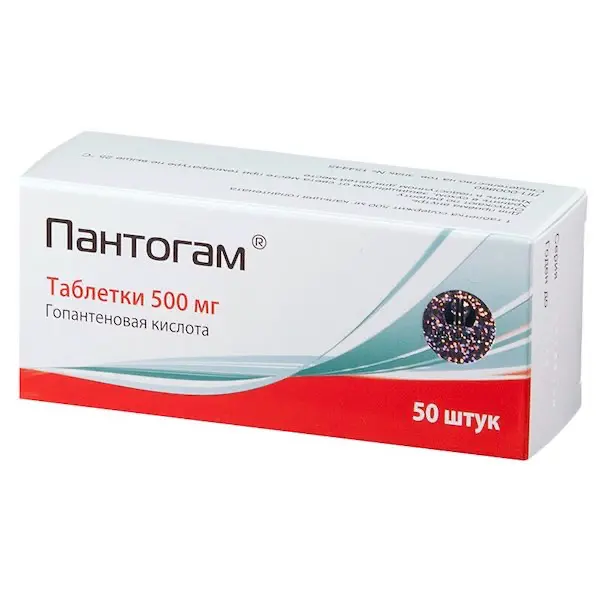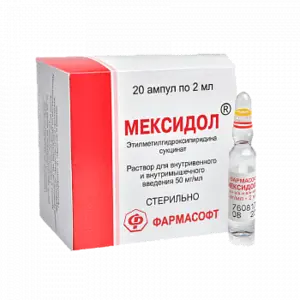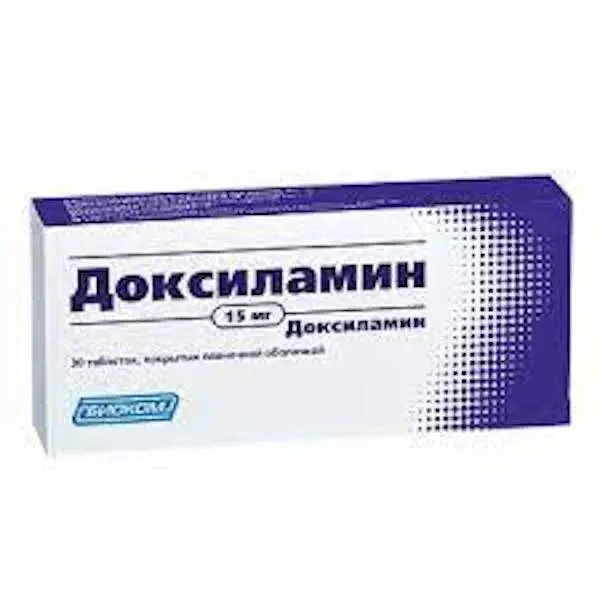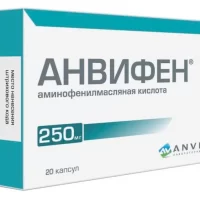Description
Pantogam Pharmacodynamics
The spectrum of action of Pantogam® is due to the presence of gamma-aminobutyric acid in its structure. The mechanism of action is due to the direct effect of Pantogam® on the GABAA-receptor-channel complex. The drug has nootropic and anticonvulsant effects. Pantogam® increases resistance of the brain to hypoxia and toxic substances, stimulates anabolic processes in neurons, combines a moderate sedative effect with a mild stimulating effect, reduces motor excitability, activates mental and physical performance. Improves GABA metabolism in chronic alcohol intoxication and after ethanol withdrawal. It is able to inhibit acetylation reactions involved in the mechanisms of inactivation of procaine (novocaine) and sulfonamides, thus prolonging the action of the latter. Causes inhibition of pathologically increased bladder reflex and detrusor tone.
Indications
Cognitive disorders in organic brain lesions (including consequences of neuroinfections and craniocerebral injuries) and neurotic disorders;
schizophrenia with cerebral organic insufficiency;
cerebrovascular insufficiency caused by atherosclerotic changes in brain vessels;
extrapyramidal disorders (myoclonus-epilepsy, Huntington’s chorea, hepatolenticular degeneration, Parkinson’s disease, etc.), and also for treatment and prevention of extrapyramidal syndrome (hyperkinetic and akinetic) caused by taking neuroleptics;
epilepsy with delayed mental processes in complex therapy with anticonvulsants;
psycho-emotional overload, decreased mental and physical performance, to improve concentration and memory;
neurogenic disorders of urination (pollakiuria, imperative urges, imperative urinary incontinence, enuresis);
Children with perinatal encephalopathy, mental retardation
Contraindications .
Hypersensitivity, acute severe kidney disease, pregnancy, lactation, children under 3 years of age
Dosage and administration
- Inside 15-30 minutes after a meal.
- A single dose for adults is usually 0.25-1 g, for children – 0.25-0.5 g; a daily dose for adults – 1.5-3 g, for children – 0.75-3 g. The course of treatment is from 1 to 4 months, in some cases up to 6 months. In 3 to 6 months it is possible to carry out the second course of treatment.
- In epilepsy in combination with anticonvulsants at a dose of 0.75 to 1 g per day. The course of treatment is up to 1 year or more.
- In extrapyramidal neuroleptic syndrome in combination with the ongoing therapy a daily dose of up to 3 g, treatment for several months.
- In extrapyramidal hyperkinesias in patients with hereditary diseases of the nervous system in combination with the current therapy – 0.5 to 3 g per day. The course of treatment should be up to 4 months and more.
- In the aftermath of neuroinfections and craniocerebral injuries 0.25 g 3-4 times a day.
- For restoration of ability to work at high loads and asthenic conditions Pantogam® is prescribed 0.25 g 3 times a day.
- For treatment of extrapyramidal syndrome caused by taking neuroleptics: adults 0.5-1 g 3 times a day, children – 0.25-0.5 g 3-4 times a day. The course of treatment is 1-3 months.
- In children with tics: 0.25-0.5 g 3-6 times a day for 1-4 months.
- In case of urinary disorders: adults 0.5-1 g 2-3 times a day, children 0.25-0.5 g (daily dose is 25-50 mg/kg). The course of treatment is from 1 to 3 months.
- For children with various pathologies of the nervous system, depending on the age, the drug is recommended in a dose of 1-3 g. The tactics of drug administration: dose increase within 7-12 days, maximum dose for 15-40 days and gradual dose decrease until cancellation of Pantogam® within 7-8 days. As for any other nootropic medicine, a break between the courses of Pantogam® doses is from 1 to 3 months.
- Under long-term treatment it is not recommended to take the drug simultaneously with other nootropic and stimulant drugs. Taking into account the nootropic effect of the drug, its administration is preferably carried out in the morning and afternoon hours.





